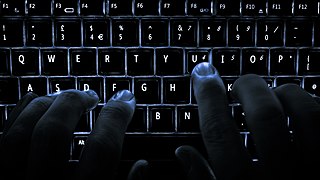Journalism is the production and distribution of reports on the interaction of events, facts, ideas, and people that are the "news of the day" and that informs society to at least some degree of accuracy. The word, a noun, applies to the occupation, the methods of gathering information, and the organizing literary styles.
Ethical codes are adopted by organizations to assist members in understanding the difference between right and wrong and in applying that understanding to their decisions. An ethical code generally implies documents at three levels: codes of business ethics, codes of conduct for employees, and codes of professional practice.
Journalism scandals are high-profile incidents or acts, whether intentional or accidental, that run contrary to the generally accepted ethics and standards of journalism, or otherwise violate the 'ideal' mission of journalism: to report news events and issues accurately and fairly.

The news media or news industry are forms of mass media that focus on delivering news to the general public. These include news agencies, newspapers, news magazines, news channels etc.

Photojournalism is journalism that uses images to tell a news story. It usually only refers to still images, but can also refer to video used in broadcast journalism. Photojournalism is distinguished from other close branches of photography by having a rigid ethical framework which demands an honest but impartial approach that tells a story in strictly journalistic terms. Photojournalists contribute to the news media, and help communities connect with one other. They must be well-informed and knowledgeable, and are able to deliver news in a creative manner that is both informative and entertaining.
The ethics of technology is a sub-field of ethics addressing the ethical questions specific to the Technology Age, the transitional shift in society wherein personal computers and subsequent devices provide for the quick and easy transfer of information. Technology ethics is the application of ethical thinking to the growing concerns of technology as new technologies continue to rise in prominence.
Journalistic ethics and standards comprise principles of ethics and good practice applicable to journalists. This subset of media ethics is known as journalism's professional "code of ethics" and the "canons of journalism". The basic codes and canons commonly appear in statements by professional journalism associations and individual print, broadcast, and online news organizations.
Mass communication is the process of imparting and exchanging information through mass media to large population segments. It utilizes various forms of media as technology has made the dissemination of information more efficient. Primary examples of platforms utilized and examined include journalism and advertising. Mass communication, unlike interpersonal communication and organizational communication, focuses on particular resources transmitting information to numerous receivers. The study of mass communication is chiefly concerned with how the content and information that is being mass communicated persuades or affects the behavior, attitude, opinion, or emotion of people receiving the information.
Civic journalism is the idea of integrating journalism into the democratic process. The media not only informs the public, but it also works towards engaging citizens and creating public debate. The civic journalism movement is an attempt to abandon the notion that journalists and their audiences are spectators in political and social processes. In its place, the civic journalism movement seeks to treat readers and community members as participants.
Information ethics has been defined as "the branch of ethics that focuses on the relationship between the creation, organization, dissemination, and use of information, and the ethical standards and moral codes governing human conduct in society". It examines the morality that comes from information as a resource, a product, or as a target. It provides a critical framework for considering moral issues concerning informational privacy, moral agency, new environmental issues, problems arising from the life-cycle of information. It is very vital to understand that librarians, archivists, information professionals among others, really understand the importance of knowing how to disseminate proper information as well as being responsible with their actions when addressing information.
Source protection, sometimes also referred to as source confidentiality or in the U.S. as the reporter's privilege, is a right accorded to journalists under the laws of many countries, as well as under international law. It prohibits authorities, including the courts, from compelling a journalist to reveal the identity of an anonymous source for a story. The right is based on a recognition that without a strong guarantee of anonymity, many would be deterred from coming forward and sharing information of public interests with journalists.

Political journalism is a broad branch of journalism that includes coverage of all aspects of politics and political science, although the term usually refers specifically to coverage of civil governments and political power.
Community journalism is locally-oriented, professional news coverage that typically focuses on city neighborhoods, individual suburbs or small towns, rather than metropolitan, state, national or world news.

Cyberethics is the philosophic study of ethics pertaining to computers, encompassing user behavior and what computers are programmed to do, and how this affects individuals and society. For years, various governments have enacted regulations while organizations have defined policies about cyberethics.
Media Relations involves working with media for the purpose of informing the public of an organization's mission, policies and practices in a positive, consistent and credible manner. It can also entail developing symbiotic relationships with media outlets, journalists, bloggers, and influencers to garner publicity for an organization. Typically, this means coordinating directly with the people responsible for producing the news and features in the mass media. The goal of media relations is to maximize positive coverage in the mass media without paying for it directly through advertising.
The code of ethics in media was created by a suggestion from the 1947 Hutchins Commission. They suggested that newspapers, broadcasters and journalists had started to become more responsible for journalism and thought they should be held accountable.
The following outline is provided as an overview of and topical guide to journalism:
Drone journalism is the use of drones, or unmanned aircraft systems (UAS), for journalistic purposes. According to the Federal Aviation Administration, "an unmanned aircraft is a device that is used, or is intended to be used, for flight in the air with no onboard pilot".
Communication ethics is a sub-branch of moral philosophy regarding the better understanding of all manifestations of communicative interaction. Its most nearby disciplines are the sociolinguistics, media ethics and the various codes of conduct like the journalistic ethics and standards.
Internet universality is a concept and framework adopted by UNESCO in 2015 to summarize their position on the Internet. The concept recognizes that "the Internet is much more than infrastructure and applications, it is a network of economic and social interactions and relationships, which has the potential to enable human rights, empower individuals and communities, and facilitate sustainable development."{{Citation needed}} The concept is based on four principles stressing the Internet should be human rights-based, open, accessible, and based on the multi-stakeholder participation. These have been abbreviated as the R-O-A-M principles. Understanding the Internet in this way helps to draw together different facets of Internet development, concerned with technology and public policy, rights and development."




